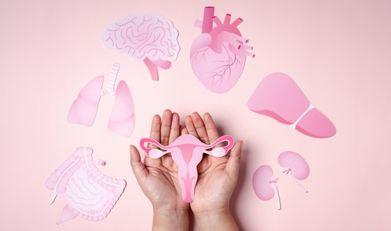What is PCOS (Poly Cystic Ovarian Syndrome)?
PCOS or Polycystic Ovary Syndrome is a condition where women develop small cysts in their ovaries. It is not a serious or harmful condition, but it does cause hormonal changes in women. The multiple cysts on the ovaries lead to excessive hormone production particularly androgen, which leads to male tendencies, internally and externally.
Symptoms tend to vary from person to person. Some have excessive facial or body hair, while others lose hair. Some feel sluggish, experience acne and mood swings and suffer irregular periods. Many people gain weight and find it difficult to lose it.
Admittedly, none of these symptoms are life-threatening but, definitely, inconvenient, and unwanted. Some people, who are looking for natural remedies, turn to Ayurveda for PCOS.
What are the signs of PCOS (Poly Cystic Ovarian Syndrome)?
The most common signs and symptoms of PCOS include:
- Irregular periods: Abnormal menstruation involves missing periods or not having a period at all. It may also involve heavy bleeding during periods.
- Abnormal hair growth: You may grow excess facial hair or experience heavy hair growth on your arms, chest, and abdomen (hirsutism). This affects up to 70% of people with PCOS.
- Acne: PCOS can cause acne, especially on your back, chest, and face. This acne may continue past your teenage years and may be difficult to treat.
- Obesity: Between 40% and 80% of people with PCOS have obesity and have trouble maintaining a weight that’s healthy for them.
- Darkening of the skin: You may get patches of dark skin, especially in the folds of your neck, armpits, groin (between the legs), and under your breasts. This is known as acanthosis nigricans.
- Cysts: Many people with PCOS have ovaries that appear larger or with many follicles (egg sac cysts) on ultrasound.
- Skin tags: Skin tags are little flaps of extra skin. They’re often found in your armpits or on your neck.
- Thinning hair: People with PCOS may lose patches of hair on their head or start to bald.
- Infertility: PCOS is the most common cause of infertility in people with AFAB. Not ovulating regularly or frequently can result in not being able to conceive.
What is the main cause of PCOS?
The exact cause of PCOS is unknown. There’s evidence that genetics play a role. Several other factors, most importantly obesity, also play a role in causing PCOS:-
- Higher levels of male hormones called androgens:- High androgen levels prevent your ovaries from releasing eggs, which causes irregular menstrual cycles. Irregular ovulation can also cause small, fluid-filled sacs to develop in your ovaries. High androgen also causes acne and excess hair growth in women and people with AFAB.
- Insulin resistance:- An increase in insulin levels causes your ovaries to make and release male hormones (androgens). Increased male hormones suppress ovulation and contribute to other symptoms of PCOS. Insulin helps your body process glucose (sugar) and use it for energy. Insulin resistance means your body doesn’t process insulin correctly, leading to high glucose levels in your blood. Not all individuals with insulin resistance have elevated glucose or diabetes, but insulin resistance can lead to diabetes. Having overweight or obese can also contribute to insulin resistance. An elevated insulin level, even if your blood glucose is normal, can indicate insulin resistance.
- Low-grade inflammation:- People with PCOS tend to have chronic low-grade inflammation. Your healthcare provider can perform blood tests that measure levels of C-reactive protein (CRP) and white blood cells, which can indicate the level of inflammation in your body.
FAQs on Women’s Health and Wellness
1. Is PCOS or Polycystic Ovary Syndrome genetic?
Researchers are learning more about the causes of PCOS. However, some evidence shows PCOS has a genetic or hereditary component. This means if your biological parent has PCOS, you may be more likely to have it, too.
2. Can PCOS or Polycystic Ovary Syndrome be cured?
Yes, PCOS can be completely cured with regular exercise, proper diet, and using 100% Ayurvedic Syrup Sundri Sudha recommended by Dhanwantri Pharmaceutical.
3. How can I lose weight caused by PCOS?
Unhealthy and drastic weight gain is something that many people struggle with, especially those with PCOS. While exercises and yoga always help with weight loss, Dhanwantri Pharmaceutical recommends that you consume PCOS 100% Ayurvedic syrup Sundri Sudha which can help to reduce the impact of PCOS and support weight loss.
4. Is ginger good for PCOS?
Ginger is an effective remedy for PCOS as it increases blood production and circulation in the body and even at a high dose doesn't have any side effects.
5. Are PCOD and PCOS the same?
PCOD and PCOS are both ovarian conditions but PCOD is a condition where the ovaries produce immature eggs. PCOS is worse than PCOD but both conditions can be managed easily if detected in time and with easy home remedies and lifestyle changes.

